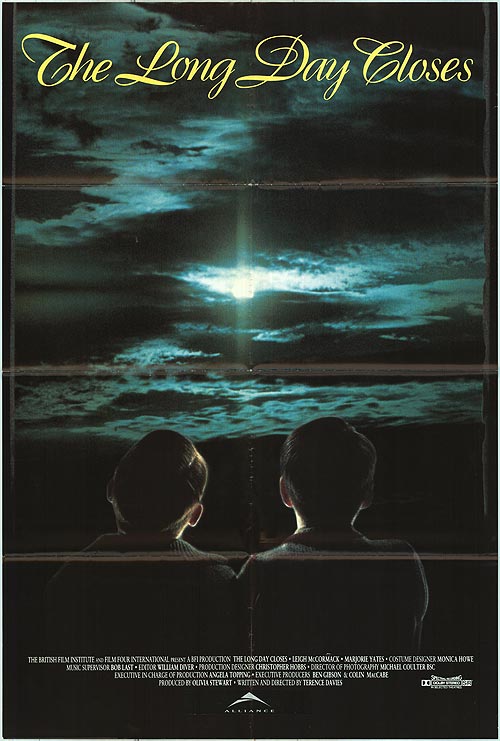
LONG DAY CLOSES, THE
(director/writer: Terence Davies; cinematographer: Michael Coulter; editor: William Diver; cast: Leigh McCormack (Bud), Anthony Watson (Kevin), Nicholas Lamont (John), Ayse Owens (Helen ), Marjorie Yates (Bud’s Mother); Runtime: 85; BFI/Film Four; 1992-UK)
“This film is a love letter to the cinema.”
Reviewed by Dennis Schwartz
This film is a love letter to the cinema. Some well-known Hollywood musical films are paid homage to — as Davies uses the following quote from Orson Welles’ The Magnificent Ambersons: “In those days they had time for everything.” It is directed by Terence Davies (Distant Voices, Still Lives) with a reverie for an 11-year-old’s private thoughts and is set in the working-class Liverpool of 1955-56.
The film is about the child’s innocent autobiographical reflections, which are devoid of sentimentality and are emotionally rich, allowing us to see what influenced him as a child. What the film lacks in script and conventional production values, it makes up in poetical lyricism. What takes place on the screen is a series of close-ups of the child and allusions about the child’s reactions to growing up, without any particular effort to tell a story. It makes for a different way of filmmaking, one that is plotless. Yet there are shots that are memorable, making me want to applaud Davies for the effort more than for the result.
Bud (Leigh McCormack) is the gentle child seen reacting with his elder siblings and his warm mother (Yates), and with the other children in his junior school. At home, he seems to be a momma’s boy, staying mostly alone and listening to the radio. When he goes out, it is mostly to the cinema. Movies are his one true enjoyment and escape from the terrors of growing up, as they are more valuable lessons to him than what he learns in school.
Bud is framed in most shots, where he is seen off alone by the window, watching his neighbors interact or watching his mother hang the clothes out to dry. The tableaux-like compositions are elegantly stated, whether it is a sunny day and the neighborhood is seen in a cheery mood or during a driving rain storm where the street he resides in looks forlorn, or inside his mother’s flat on Christmas with the window showing inclement weather outside but the house is warm inside with song and food. Bud is learning to live with school bullies, teachers who hit him on the back of his hand and demand obedience, the heavy Catholic symbolism he’s subjected to, and his own nightmarish dreams. He seems to be innocent of sexual desires.
The film, like the reading of poetry, demands concentration on its visualizations. The evocative closing shot of “The Long Day Closes” is of a striking sunset in black & white images. The suggestion being of how grinding this childhood period was for the child trying to come to grips with things, but who now looks back at it and he can see all the beauty that was always there; and, not the least beautiful memory, being the way his mother always had such a chipper attitude.
There is a warm place in the film reserved for the standard contemporary pop music of the times, with such songs as: “I don’t know why I love you like I do”; “At Sundown,” which is sung by Doris Day; Judy Garland sings “Over the Bannister”; “Tammy” is sung by Debbie Reynolds.”
The major problem with this experimental film is not its poetic style or its wonderful images, but that it is not a fulfilling cinematic experience because we don’t get to know any characters in the film with any depth and we are more or less left with snapshot impressions of what Bud experienced rather than feeling we know him better than that. For those who have fallen in love with art films, this one might be better suited to your taste than to the general public’s.
REVIEWED ON 5/17/2000 GRADE: C +